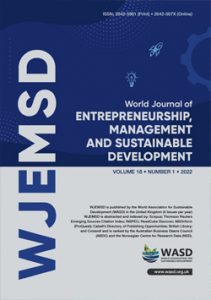Firm–civil society organizational collaborations in the context of corporate social responsibility (CSR) initiatives; development of collaboration typology, Som Bhattacharyya and Surabhi Verma
 Som Sekhar Bhattacharyya
Som Sekhar Bhattacharyya
Department of Strategic Management
National Institute of Industrial Engineering (NITIE), Mumbai
India
Email: somdata@gmail.com
Surabhi Verma
Center of Integrative Innovation Management, Department of Marketing and Management
University of Southern Denmark, Odense
Denmark
DOI: 10.1108/WJEMSD-12-2019-0101
Purpose: Business firms operate in society not only for market gains but also for generating positive social externalities. Civil society organisations (CSO) have helped society to develop across various spheres of influence. The concept of corporate social responsibility (CSR) ushered in an era wherein both business economic objectives as well as socio-environmental responsibilities of firms were prioritized simultaneously. The path of firms and CSOs intersected through CSR. In this work, the authors develop a typology on firm–CSO collaboration regarding CSR initiatives.
Design/methodology/approach: The authors through a twin approach of systematic literature review (SLR) with qualitative study developed a categorization of collaborations between a firm and a CSO in the context of CSR engagements. Apart from the SLR, the authors undertook two focus group discussions (FGD) with CSR experts (engaged in firm–CSO collaboration). This was done with a semi-structured discussion agenda frame. The data were content analysed for thematic aspects. Thus, both SLR as well as FGD outputs were considered for the study results.
Findings: The authors found six elements in firm–CSO collaboration and seven archetypes of collaboration. The six elements were CSR action elements (CSRAE) consisting of CSR agenda (CSRA), CSR resources (CSRR), CSR capabilities (CSRC), CSR Pprocess (CSRP), CSR monitoring (CSRM) and CSR stakeholder engagement (CSRSE). The seven typologies were CSO as auditor , outsourcing of CSR , CSO-driven CSR, joint CSR, support to CSO for CSR ,guided support to CSO and coordinated CSR.
Research limitations/implications: Doty and Glick, (1994) had undertaken a seminal work on theory building based upon the unique method of application of typologies. Doty and Glick, (1994) elucidated how application of typologies could through a typology study enhance the scope and level for understanding and modelling in a contextual domain involving theory. This study was a step in this direction in the context of firm–CSO collaboration in the context of CSR initiatives.
Practical implications: This study would help managers from both CSOs and business firms to comprehend in which sphere they were required to collaborate like in resource /capabilities deployment or in designing CSR agendas or CSR process or CSR monitoring or in stakeholder engagement during CSR management. This typology would enable managers to comprehend what would be the most suitable form of collaboration between a firm and a CSO for a specific CSR engagement.
Originality/value: This is one of the first studies that theorizes regarding firm–CSO collaboration in the context of CSR initiatives both in terms of the collaboration building block elements as well as typology presented.
Keywords: Civil society organisation; Corporate social responsibility; Collaborative framework; Typology.
Citation: Bhattacharyya, S.S. and Verma, S. (2020), "Firm–civil society organizational collaborations in the context of corporate social responsibility (CSR) initiatives; development of collaboration typology", World Journal of Entrepreneurship, Management and Sustainable Development, Vol. 16 No. 4, pp. 359-375. https://doi.org/10.1108/WJEMSD-12-2019-0101

